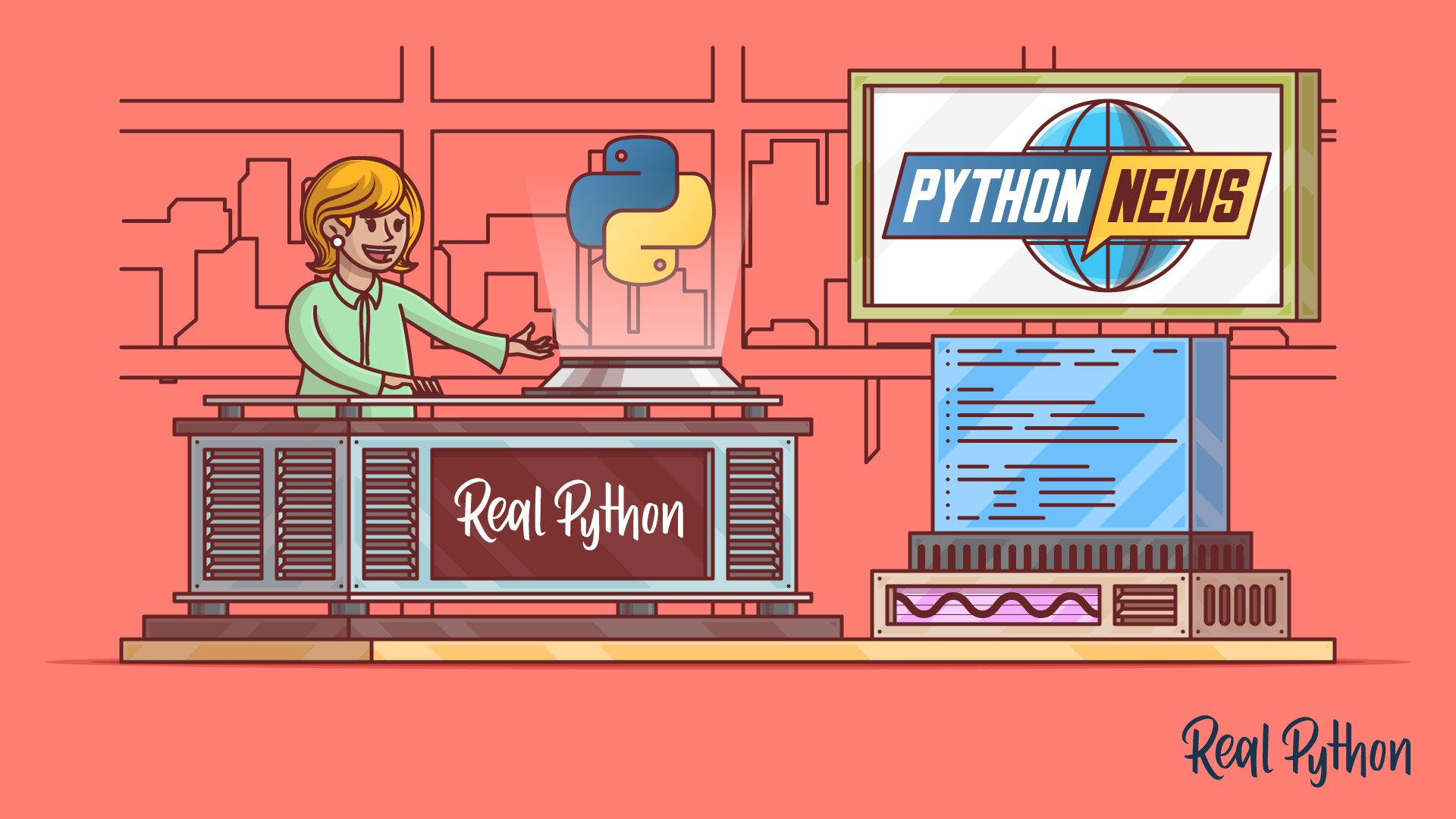June 2023 welcomed a lot of new people and positions to the Python Software Foundation (PSF). Elections wrapped up for directors, and a new security developer in residence got to work. The organization is still looking to expand, though, and it announced a new deputy CPython developer in residence position that could go to a less seasoned programmer. Over at Pydantic, version 2 brings improved performance, while the sun went down on Python 3.7.
It’s summer, so get ready for some hot Python news!
Join Now: Click here to join the Real Python Newsletter and you’ll never miss another Python tutorial, course, or news update.
PSF Elects New Directors
The Python Software Foundation (PSF) is the nonprofit organization behind Python. If you’re wondering what exactly the PSF does, the answer is a bunch! Here’s a bird’s-eye view of their role in the language and community:
The mission of the Python Software Foundation is to promote, protect, and advance the Python programming language, and to support and facilitate the growth of a diverse and international community of Python programmers. (Source)
Elections to fill four seats on the PSF board of directors occurred during the second half of June. A term for a seat on the PSF board of directors lasts three years, and directors are eligible for reelection. To vote in this election, you had to be a registered PSF member with voting rights.
This year, there were a lot of nominees. In this crowded race, four people received the most votes and were elected to fill the seats:
If you’re curious about what it means to serve on the PSF board and what a director’s duties are, then you can watch a video in which three board members describe Life as a Python Software Foundation Director.
Congratulations to the new and returning board directors, and big thanks to all the other nominees for their continued engagement in the Python community. Community service is what keeps Python thriving.
PSF Announces New Security Developer in Residence
The PSF grew in another way this June, when they hired a new security developer in residence (SDIR) as part of a year-long security enhancement initiative.
The search began in January, when the PSF first advertised the role. A big congratulations to Seth Michael Larson for answering the call! He joins the PSF for the next year as the organization’s first-ever security developer in residence.
Here’s what he had to say about the news:
I’m honored to have been selected by the PSF to be the inaugural SDIR. The Python community is such a positive part of my life, so I’m grateful for this incredible opportunity to contribute back. I’m looking forward to partnering with all of you to build a more secure Python ecosystem for everyone. (Source)
What exactly does this role involve? The SDIR has quite a few responsibilities, such as conducting a security audit, working to improve and formalize security practices, and dealing with vulnerabilities and issues across the ecosystem. Along the way, Seth will be measuring the impact of all these efforts, so stay tuned for those metrics.
Seth is no stranger to the Python community. He was a 2022 PSF Fellow and is a prolific blogger on security issues, among other topics. It looks like he’ll be posting weekly reports during his time as the SDIR. At the time of publication, the most recent report is from week two, so you can check out what he’s been up to so far.
Many thanks to the PSF for putting safety first and to the Open Software Security Foundation (OpenSSF) Alpha-Omega Project for funding the role!
Pydantic 2 Released
Pydantic is a Python library that provides runtime type checking and data validation for Python objects. You’ll often use it for defining and validating a data structure before processing or storing data.
With over seventy million monthly downloads, Pydantic is Python’s most-used data validation library, so a new release is certainly a cause for celebration! Terrance Dorsey and Samuel Colvin marked the occasion with the following announcement:
The last few months have involved a whirlwind of work, and we’re finally ready to announce to official release of Pydantic V2! (Source)
The main features and advantages of this new release are performance improvements thanks to a huge refactoring of the internals of the package. Some of the new features in this version include:
- Improved performance: Implementing the validation and serialization logic in Rust means that Pydantic 2 is now up to fifty times faster than earlier versions.
- Strict mode: This allows complete control over data coercion, which comes in handy when you want Pydantic to throw an error instead of converting values to the correct type.
- A formalized conversion table: This clarifies the process of data conversion across various scenarios so that you know exactly what will happen during the validation of your data.
There’s a lot more to explore, and you can check out the full documentation and changelog for more details.
If you’d like to go ahead and start working with this new version of Pydantic, then you should make sure to read the migration guide to avoid any breaking changes.
Python 3.7 Reaches End of Life
If you’re using Python 3.7, then it’s probably time to upgrade. Keeping up-to-date with the latest Python release means that you’re getting regular updates that keep you safe and ensure your code runs smoothly.
Python 3.7 was released five years ago, in June 2018. This means that its end of life is happening right on schedule, as Python versions are typically maintained for five years.
What does end of life mean? PEP 537 notes that for the first two years following a stable release, bugfix and security releases come out every three months. But after the two-year mark, you’ll just see periodic releases to fix security issues. When a Python version reaches its end of life, that means it’s not even getting security fixes. Of course, that’s not great for your code’s security!
Note: If you’d like to learn more about the life cycle of a Python version, then check out Should You Update to the Latest Python Bugfix Version? Spoiler alert: the answer is yes!
If you want the latest stable Python version, then 3.11 is your best bet. You can read about all that it has to offer in Python 3.11: Cool New Features for You to Try. Or if you want to get ahead of the game, check a pre-release version of Python 3.12, which promises ever better error messages and support for the Linux perf profiler.
PSF Hiring a Deputy CPython Developer in Residence
Finally, if all this talk about Python has you itching to make a huge impact on the language, then you’re in luck! The PSF is hiring a full-time deputy CPython developer in residence. The person in this position will spend lots of time combing through GitHub to triage issues and review code. They’ll be reporting to the CPython developer in residence.
So, what does CPython developer in residence Łukasz Langa have to say about the position? He makes it sound pretty appealing:
You should consider it, it’s an adventure of a lifetime! (Source)
He also notes that the deputy will be key in shaping Python 3.13, and he’d love to work with an up-and-coming developer in a mentorship role. That means that if you’re interested but don’t have as much experience under your belt as you’d like, then this opportunity might be just the right fit!
On Twitter, the PSF echoed this sentiment:
Are you considering applying for our Deputy CPython Developer in Residence role? This is intended as junior role so if you think you could grow into it, we’d absolutely love to hear from you. (Source)
Applications close on July 26, 2023. To learn more or apply, check out the official posting. Good luck!
What’s Next for Python?
Maybe you, if you apply for the role of CPython deputy developer in residence! It’s exciting to see the Python Software Foundation welcome so many new people, including a security developer in residence and four newly elected directors. June brought an end to Python 3.7 but saw a new chapter begin in the story of Pydantic.
What are you most excited about in the world of Python? Are you throwing your hat into the ring for a job with the PSF? Be sure to congratulate Seth Michael Larson and the new PSF directors in the comments!
Join Now: Click here to join the Real Python Newsletter and you’ll never miss another Python tutorial, course, or news update.







